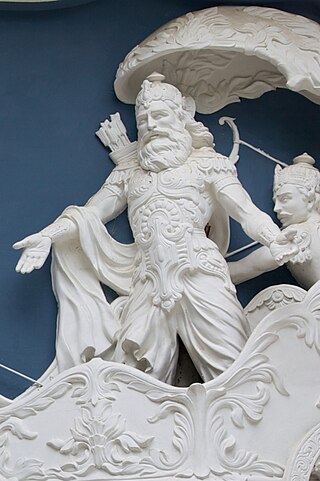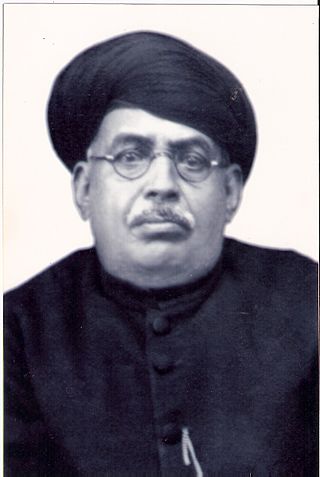Related Research Articles

Dayanand Saraswati also known as Maharshi Dayanand is an Indian philosopher, social leader and founder of the Arya Samaj, a reform movement of the Vedic dharma. His Magnus Opus is the book Satyarth Prakash which has remained a highly influential text on the Philosophy of the Vedas and clarifications of various ideas and duties of Human Beings. He was the first to give the call for Swaraj as "India for Indians" in 1876, a call later taken up by Lokmanya Tilak. Denouncing the idolatry and ritualistic worship, he worked towards reviving Vedic ideologies. Subsequently, the philosopher and President of India, S. Radhakrishnan called him one of the "makers of Modern India", as did Sri Aurobindo.

Kshatriya is one of the four varna of Hindu society, associated with warrior aristocracy. The Sanskrit term kṣatriyaḥ is used in the context of later Vedic society wherein members were organised into four classes: brahmin, kshatriya, vaishya and shudra.
The Aranyakas are a part of the ancient Indian Vedas concerned with the meaning of ritual sacrifice. They typically represent the later sections of the Vedas, and are one of many layers of Vedic texts. The other parts of the Vedas are the Samhitas, Brahmanas (commentary), and the Upanishads.

Sachchidananda Hirananda Vatsyayan, popularly known by his pen name Agyeya, was an Indian writer, poet, novelist, literary critic, journalist, translator and revolutionary in Hindi language. He pioneered modern trends in Hindi poetry, as well as in fiction, criticism and journalism. He is regarded as the pioneer of the Prayogavaad (experimentalism) movement in modern Hindi literature.

In Dharmic culture, the tilaka is a mark worn usually on the forehead, at the point of the Ajna chakra, or sometimes another part of the body such as the neck, hand, chest or arm. Tilaka may be worn daily or for rites of passage or special spiritual and religious occasions only, depending on regional customs.

Kanhaiyalal Maneklal Munshi, popularly known by his pen name Ghanshyam Vyas, was an Indian independence movement activist, politician, writer and educationist from Gujarat state. A lawyer by profession, he later turned to author and politician. He is a well-known name in Gujarati literature. He founded Bharatiya Vidya Bhavan, an educational trust, in 1938.

Gaurishankar Hirachand Ojha, born in Rohida village of Sirohi District, was a historian from the Indian state of Rajasthan. A prolific author, he wrote several books on the history of Rajasthan and other historical subjects. Subsequent historians from Rajasthan have referred to him as Guruvara Mahamahopadhyaya. Ojha regarded Kaviraj Shyamaldas as his guru and worked under him as assistant secretary of the historical department, Udaipur

Govind Chandra Pande was a well-known Indian scholar, philosopher and historian of the Vedic and the Buddhist periods. He served as professor of ancient history and vice-chancellor at Jaipur and Allahabad universities. He was also the chairman of the Indian Institute of Advanced Study, Simla for several years, the Chairman of Allahabad Museum Society and the Chairman of Central Tibetan Society, Sarnath Varanasi.

Satya Vrat Shastri was an Indian Sanskrit scholar, writer, grammarian and poet. He wrote three Mahakavyas, three Khandakavyas, one Prabandhakavyas and one Patrakavya and five works in critical writing in Sanskrit. His important works are Ramakirtimahakavyam, Brahattaram Bharatam, Sribodhisattvacharitam, Vaidika Vyakarana, Sarmanyadesah Sutram Vibhati, and "Discovery of Sanskrit Treasures" in seven volumes.

Bhagirath Prasad Tripathi, better known as Vagish Shastri, was an Indian Sanskrit grammarian, linguist, tantra and yogi. In 2018, Government of India awarded him the fourth highest civilian award Padma Shri for his work in the field of literature and education.
Pt. Sitaram Chaturvedi, also known as Acharya Sita Ram Chaturvedi, was an eminent Indian educator, dramatist and scholar of Hindi and Sanskrit language and literature.
"Tarkateertha" Lakshman Shastri Joshi was an Indian scholar, of Sanskrit, Hindu Dharma, and a Marathi literary critic, and supporter of Indian independence. Mahatma Gandhi chose him to be his principal advisor in his campaign against untouchability. Joshi was equally a pragmatist, endorsing Nehru's investments in higher education and heavy industry.

Devarshi Kala Nath Shastry was born on 15 July 1936. He is a Sanskrit scholar honoured by the President of India in 1988. He is an Indologist and a prolific writer of Sanskrit, Hindi and English, and a well-known linguist, who has contributed to the campaign of evolving technical terminology in Indian languages and ensuring a respectable status to Hindi, the official language of his state and the Indian union.

Rewa Prasad Dwivedi was a Sanskrit scholar, poet, writer, teacher, and critic. His original works include poetry as epics and lyrics, plays, and prose. He wrote new literature under the pseudonym "sanatana", meaning 'the eternal'. He is also known as 'Acharya' Dwivedi.
Samiran Chandra Chakrabarti is an Indian Indologist and scholar of Onomastics & Vedic Studies, Author & Editor.
Brij Bihari Chaubey, was a Vedic and Sanskrit scholar based in Hoshiarpur, Punjab. He was awarded the President's Certificate of Honour by A. P. J. Abdul Kalam in 2004.

Vasudeva Upanishad (Sanskrit: वासुदेव उपनिषत्, or Vasudevopanishad is one of 108 Upanishadic Hindu texts, written in Sanskrit language. It belongs to the Vaishnava sect, which worships Vishnu and his avatar Krishna, and this late medieval era minor Upanishad is attached to the Samaveda. It is one of the 14 Vaishnava Upanishads dedicated to Vaishnava sacred marks, including the Urdhva Pundra - the Vaishnava tilaka. It is described in a sermon by Krishna to the sage Narada.

The Atma Upanishad, is one of the minor Upanishadic texts of Hinduism, written in Sanskrit language. It is one of the 31 Upanishads, associated with the Atharvaveda. It is classified as a Samanya (general) and Vedantic Upanishad.

Pundit Devarshi Ramanath Shastri was a Sanskrit poet, scholar and commentator on Pushtimarg and Shuddhadvaita Vedanta, the philosophical school of pure non-dualism propounded by Shri Vallabhacharya (1479-1531). He was born in 1878 in Jaipur, Rajasthan in a renowned Vellanadu Brahmin family of Sanskrit scholars belonging to the Taittariya branch of Krishna Yajurveda, who migrated from Andhra Pradesh to North India in the 15th century AD and to Jaipur in the 18th century with his famous ancestor Kavikalanidhi Devarshi Shrikrishna Bhatt having been invited by Sawai Jai Singh II. His father’s name was Shri Dwarakanath Bhatt and mother’s name was Shrimati Janaki Devi. His only son was Devarshi Brajnath Shastri (1901-1954), who was also a scholar of Shuddhadvaita. He was the elder brother of epoch-making Sanskrit poet and scholar Bhatt Mathuranath Shastri. He wrote extensively in Hindi, Sanskrit and Brajbhasha languages.

The Pashupatabrahma Upanishad, also called Pasupathabrahmopanishad, is a minor Upanishadic text written in Sanskrit. It is one of the 31 Upanishads attached to the Atharvaveda, and is classified as one of the 20 Yoga Upanishads.
References
- ↑ "Sahitya Akademi awards for 7 novelists". The Hindu . Chennai, India. 24 December 2008. Archived from the original on 25 January 2009.
- ↑ Rs 16 lakh for new Sanskrit dept, Tribune News Service, 3 August 2001
- 1 2 Asit Srivastava (27 August 2009). "Learning Sanskrit will soon be a click away". Hindustan Times. Lucknow. Archived from the original on 26 October 2010.
- ↑ Anisha Sharma (1 November 2006). "Lingo bingo: Academicians speak up for Sanskrit". The Times Of India. Lucknow.
- ↑ "Sanskrit(i) pays". The Times of India . Lucknow. 16 June 2006.
- ↑ Santwana Bhattacharya (27 April 2002). "Vedas: Govt ready with Rs 10 cr".
- ↑ The Tradition of Vedic Chanting, UNESCO website
- ↑ "Sanskrit HoD manhandled". Hindustan Times. 13 October 2006. Archived from the original on 25 January 2013.
- ↑ "In city of stars, Vedic heroes shine". Indian Express. Mumbai. 25 September 2004.
- ↑ Sanskrit Publications of Bharatiya Vidya Bhavan
- ↑ Rudradhyaya
- ↑ Hindi book
- ↑ Jivanaparvanatakam
- ↑ Vaishnav Aagam Ke Vaidik Aadhaar
- ↑ Drashtavya Jagat Ka Yatharth (vol. I), Review
- ↑ Atharvavediya Parishist Granthon Ka Parisheelan
- ↑ MLBD
- ↑ Chowkhamba Sanskrit Series
- ↑ Rasapriyaa Vibhaavanam
- ↑ Sudukktikarnamritam